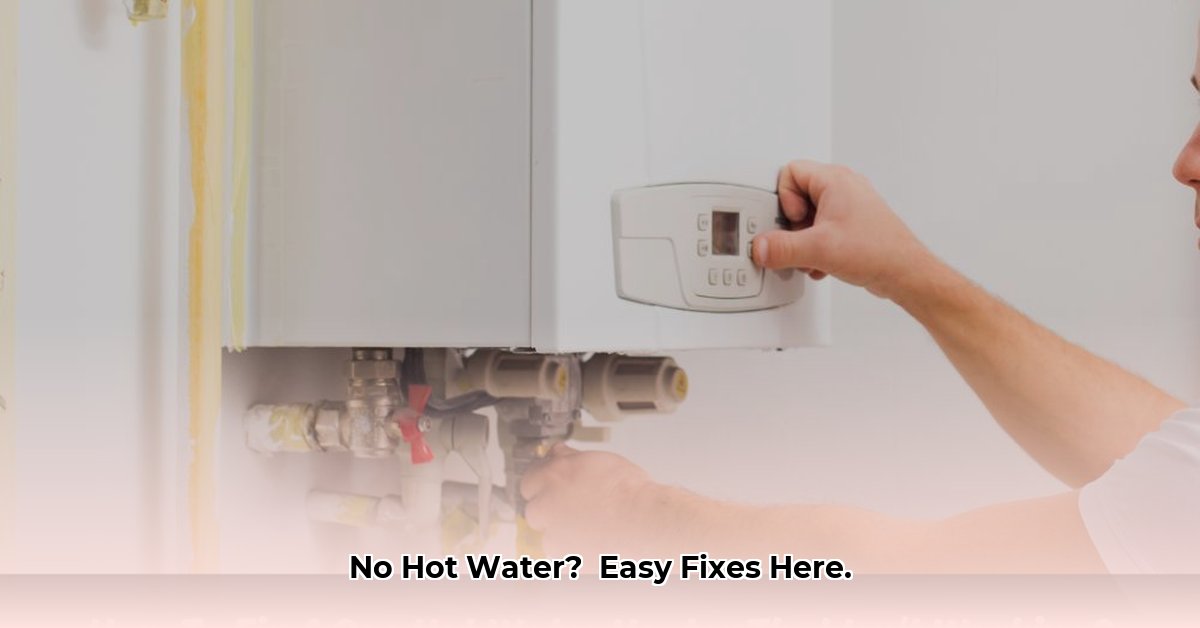Having no hot water is a common household problem, and thankfully, often an easy fix. This guide provides a practical, step-by-step approach to troubleshooting your hot water woes, empowering you to get things back on track quickly and safely.
Troubleshooting Your Hot Water Heater
A cold shower is a surefire way to ruin your morning. Before calling a plumber, there are several things you can check yourself. Let’s start with some easy checks, then move on to more specific troubleshooting based on whether you have a gas or electric water heater.
Quick Checks First
- Check the Thermostat: Is it set low? Adjust it to a comfortable temperature, ideally between 120°F and 130°F (49°C and 54°C).
- Check the Hot Water Shut-Off Valve: There’s usually a shut-off valve near the top of the water heater. Make sure it’s fully open.
- Inspect Your Main Water Supply Valve: If partially closed, this can decrease water pressure, often affecting hot water more noticeably.
Troubleshooting Electric Water Heaters
-
Check the Breaker: Locate your electrical panel (breaker box) and find the breaker labeled “water heater.” If it’s tripped (in the “off” position or halfway between “on” and “off”), flip it to “on.”
-
Check the Heating Element (Safety First!): Turn off the power to the water heater at the breaker box before proceeding. Use a multimeter to test the heating element for continuity. If the multimeter shows no continuity, the element probably needs replacing. If you are not comfortable working with electricity, call a qualified electrician.
Troubleshooting Gas Water Heaters
-
Check the Pilot Light: If the pilot light is out, try relighting it following the instructions on your water heater. If you smell gas, do not attempt to relight the pilot. Evacuate your house immediately and call your gas company or 911.
-
Check the Thermocouple: The thermocouple is a safety device that shuts off the gas if the pilot light goes out. A faulty thermocouple may prevent the burner from staying lit. Replacing a thermocouple is usually best left to a qualified plumber or gas appliance technician.
-
See if the Gas Supply is On: Check the gas valve leading to your water heater; make sure it is turned on. If it is, you may have an issue with your gas supply.
Common Hot Water Problems and Solutions
| Symptom | Possible Cause(s) | What to Do |
|---|---|---|
| No hot water at all | Tripped breaker, faulty heating element, extinguished pilot light, gas supply issue, faulty thermostat, failed heating element | Check breaker, test heating element (with caution), relight pilot, check gas supply, adjust/replace thermostat, call a professional for element replacement |
| Lukewarm water | Thermostat setting, sediment buildup, faulty dip tube, partially functioning heating element | Adjust thermostat, flush tank, inspect dip tube, call a professional regarding the element |
| Hot water runs out quickly | Small tank, sediment buildup, faulty dip tube, high demand | Consider a larger tank, flush tank, check dip tube, stagger hot water usage |
Maintaining Your Water Heater
Regular maintenance can prevent many hot water problems.
-
Flush Your Tank Annually: This removes sediment buildup, improving efficiency and extending the lifespan of your heater.
- Turn off power/gas to the water heater.
- Attach a garden hose to the drain valve.
- Run the hose to a drain.
- Open the drain valve and let the water run clear.
- Close the drain valve, disconnect the hose, and restore power/gas.
-
Check the Anode Rod (every 3-5 years): This sacrificial metal rod protects the tank from corrosion. If it’s heavily corroded, it needs replacing.
When to Call a Professional
While many of these fixes are DIY-friendly, some situations require a professional:
- Gas leaks: Always call a qualified technician or your gas company immediately.
- Complex electrical work: Don’t risk electrical shock. Call a licensed electrician.
- Major water heater repairs: If you’re unsure or uncomfortable, it’s always best to call a plumber.
Remember, while this guide is comprehensive, new research continuously emerges regarding water heater technology and maintenance best practices. Consulting a qualified plumber annually for an inspection and personalized advice is highly recommended, particularly for tankless water heaters, which have unique maintenance requirements. Be sure to keep abreast of developments for peak performance and longevity.
- Windows App to Stop Apps Running in Background Saves Battery - February 2, 2026
- How To Spot Android Apps Running In The Background - February 1, 2026
- Android App to Stop Background Apps and Save Battery - January 31, 2026










